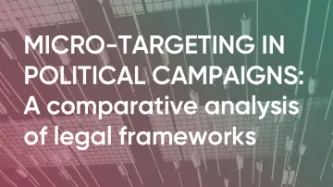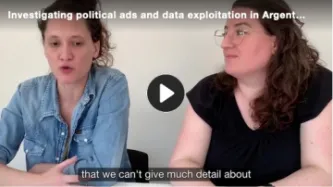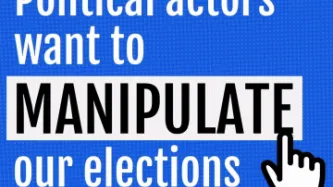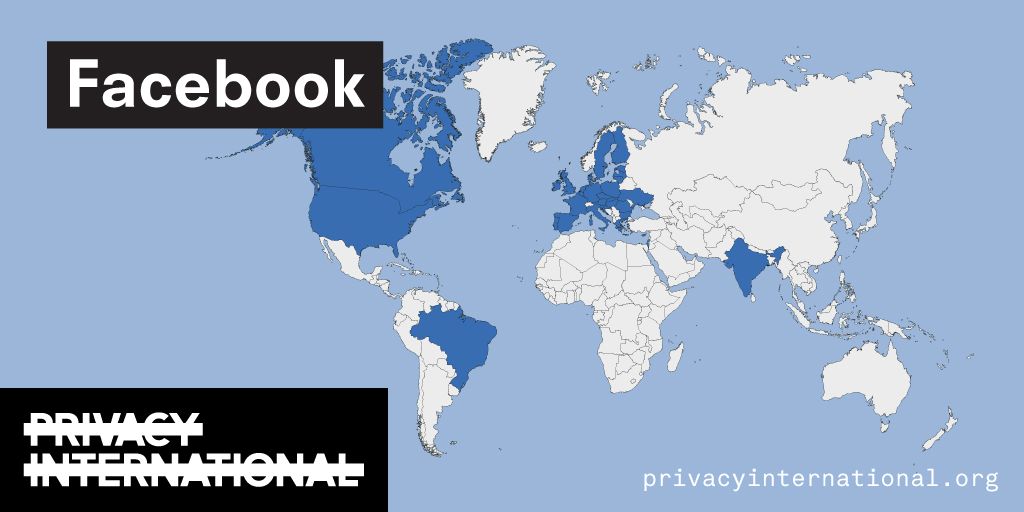Search
Content type: Video
In recent years, the use of online political campaigning has gained significant traction, with regulatory bodies often struggling to catch up. The unregulated use of political ads can pose threats to transparency, and all the more so when online platforms fail to play their part.
We at PI, together with ELSAM, are investigating the reach, effectiveness and impact of regulation by social media platforms and electoral authorities on online political advertising. Our research has shown…
Content type: Video
Nos últimos anos, o uso de campanhas políticas online ganhou força significativa, com os órgãos reguladores muitas vezes lutando para se atualizar. O uso não regulamentado da propaganda política pode representar ameaças à transparência, ainda mais quando as plataformas online deixam de cumprir a sua parte.
A PI, juntamente com o InternetLab, está investigando o alcance, a eficácia e o impacto da regulamentação por plataformas de mídia social e autoridades eleitorais na…
Content type: Examples
Article extract:
"An app that the UK’s governing party launched last year — for Conservative Party activists to gamify, ‘socialize’ and co-ordinate their campaigning activity — has been quietly pulled from app stores..."
"...We know the name of the Conservative Campaigner app’s supplier because this summer we raised privacy concerns about the app — on account of its use of uCampaign’s boilerplate privacy policy, if you clicked to read the app’s privacy policy earlier this year.
The wording…
Content type: Examples
Article extract:
"A meaty first report by the UK parliamentary committee that’s been running an inquiry into online disinformation since fall 2017, including scrutinizing how people’s personal information was harvested from social media services like Facebook and used for voter profiling and the targeting of campaign ads — and whose chair, Damian Collins — is a member of the UK’s governing Conservative Party, contains one curious omission.
Among the many issues the report raises are privacy…
Content type: Examples
Article extract:
""People with center-right views feel like the big social platforms, Facebook and Twitter, are not sympathetic to their views,” said Thomas Peters, the chief executive of uCampaign, a start-up in Washington that developed the N.R.A., Great America and Trump campaign apps. “It’s creating a safe space for people who share a viewpoint, who feel like the open social networks are not fun places for them.”
Sheltered from the broader public, however, the platforms can intensify…
Content type: Examples
Article extract:
"Ireland's two largest anti-abortion campaigns are facing questions over privacy after a BuzzFeed News analysis found that personal user data gathered by both of their apps can be shared with an international network of conservative and religious groups that includes the US National Rifle Association.
The Save the 8th campaign and the LoveBoth Project are at the forefront of the campaign to prevent the repeal of the Eighth Amendment of Ireland's constitution – which makes…
Content type: Examples
Article extract:
"French laws designed to prohibit individual-level targeting are circumvented by services like those provided by Paris-based firm Liegey Muller Pons, which aggregates personal data. Such services are no less data-intensive than those unconstrained by such legal requirements."
"• Liegey Muller Pons (LMP) is a digital campaigning firm that has provided services to over 1,000 campaigns across six European countries. French law prohibits individual-level targeting except under…
Content type: Examples
Article extract:
"On Aug. 2, the Liberal party sent an email to Liberal campaigns across the country, promoting services offered by Data Sciences Inc., a company owned by Tom Pitfield, an old friend of Justin Trudeau and the 2019 campaign’s digital director.
The party urged local campaigns to hire the company to handle their Facebook ad buys, for $5,000, $8,000 or $12,000, a significant chunk of the budget of local campaigns, which are limited by the Elections Act to about $100,000.
“The…
Content type: Examples
Article extract:
"Anti-smoking campaigners have expressed alarm that "big tobacco" has been employing two of the world's most powerful lobbying companies in a bid to stymie the introduction of plain packaging for cigarettes.
Crosby Textor, which has been hired by the Conservative party to provide "strategic direction" at the next election, has played a powerful behind-the-scenes role in mobilising opposition to the Australian government's plans for plain packaging, which became law on…
Content type: Examples
Article extract:
"The lobbying firm founded by election guru Lynton Crosby is reported to have advised private healthcare providers on how to exploit failings in the NHS..."
"...Crosby Textor advised an umbrella group of private healthcare providers on how to exploit perceived “failings”, according to a leaked document obtained by the Guardian.
The newspaper published extracts from a slideshow presentation produced for the H5 Private Healthcare Alliance, which stated that people believe the…
Content type: Examples
Article extract:
"The lobbying firm run by Boris Johnson’s close ally Sir Lynton Crosby has secretly built a network of unbranded “news” pages on Facebook for dozens of clients ranging from the Saudi government to major polluters, a Guardian investigation has found.
In the most complete account yet of CTF Partners’ outlook and strategy, current and former employees of the campaign consultancy have painted a picture of a business that appears to have professionalised online disinformation,…
Content type: Examples
Article extract:
"At the end of an alley on a nondescript street, a political consulting firm with the unusual name of Aristotle International has compiled the nation's largest voter databank, the names of 150 million Americans registered to vote. And it is selling them to politicians like George W. Bush, Joseph I. Lieberman and John McCain in ways that many fear removes too much privacy from the voting booth..."
"...Of particular concern this election season, when electronic privacy has…
Content type: Examples
Article extract:
"One of the nation's largest commercial distributors of voter data sold voter-registration lists featuring detailed personal information without verifying the identity or intent of buyers.
Aristotle International used a website to sell the lists, which contain details about registered voters from nearly every state. The data includes birth dates, home addresses, phone numbers, race, income levels, ethnic backgrounds and, in some cases, religious affiliations.
Although voter-…
Content type: Examples
Article extract:
"Knowing your business is big business for Aristotle Inc., whose Orwellian database of voter records has been an essential campaign tool for every president since Ronald Reagan. As the 2008 race heats up, the company’s shadowy founder, John Aristotle Phillips, unveils his most powerful personal-space invader yet."
Link: https://www.vanityfair.com/news/2007/12/aristotle200712
Author: James Verini
Publication: Vanity Fair
Publication date: 12 December 2007
Content type: Examples
Article extract:
"Amid concerns about the rampant spread of “fake news”— and fearful memories of scores of deaths during the 2007 election— it was another seismic development in a fraught election. Last weekend, staffers at Aristotle, an American data firm working for the opposition party, were deported from the country after what a spokesperson described as an aggressive detention..."
"...Last weekend, a group of unidentified men in black hoodies arrived at the Nairobi apartment of John…
Content type: Video
In recent years, the use of online political campaigning has gained significant traction, with regulatory bodies often struggling to catch up. The unregulated use of political ads can pose threats to transparency, and all the more so when online platforms fail to play their part.
We at PI, together with InternetLab, are investigating the reach, effectiveness and impact of regulation by social media platforms and electoral authorities on online political advertising. Our research has…
Content type: Report
This paper examines the various legal frameworks governing micro-targeting in political campaigns in six states: Canada, Brazil, France, Italy, Spain and the UK. It aims to assess national practices as well as point out gaps in their respective frameworks. The paper commences by examining how micro-targeting is defined and thereafter examines the legal provisions applicable to micro-targeting activities.
To do this in an accessible way, the paper follows and analyses the series of activities…
Content type: Examples
Less than a week before the election, the Democratic Party reported that Facebook's social media advertising systems had prevented the campaign from running some ads, allegedly resulting in the loss of more than $500,000 in potential campaign donations.
According to Facebook, the flaws resulted from a change in its political ads policy for the final week of the campaign. The policy change was intended to prevent political advertisers from uploading new ads in the week…
Content type: Frequently Asked Questions
On 27 October 2020, the UK Information Commissioner's Office (ICO) issued a report into three credit reference agencies (CRAs) - Experian, Equifax and TransUnion - which also operate as data brokers for direct marketing purposes.
After our initial reaction, below we answer some of the main questions regarding this report.
Content type: Video
The incorporation of new technologies to electoral processes is a phenomenon with a global and exponential growth. Despite its benefits, online campaigning is not without challenges, and can pose threats to transparency and equity in electoral competition. Given the role of elections as foundational pillars of the democratic system and a key gateway for the exercise of fundamental civil rights, these implications must be assessed with care and through specific tools.
We at PI, together…
Content type: Video
Immediately following the UK general election in December 2019, we worked with Open Rights Group to commission a YouGov poll about public understanding and public opinion about the use of data-driven campaigning in elections.
The poll used a representative sample of 1,664 adults across the UK population.
'Data-driven political campaigning' is about using specific data about you to target specific messages at you. So, for this might involve knowing that you are, for example, likely to…
Content type: Explainer
Television offers some of the earliest instances of digital marketing. The majority of television channels rely on commercials and advertisements to maintain their operations. For the past 75 years, TV adverts have been passive transmissions broadcast to viewers, the demographics of the channels audience guiding the kinds of products and services shown during commercial breaks and intermissions. With the changes in the way individuals are now consuming content however, broadcasters are trying…
Content type: Examples
In December 2018, Facebook provided an update on the civil rights audit it asked civil rights leader Laura Murphy to undertake in May. Based on advice Murphy culled from 90 civil society organisations, Facebook said it had expanded its policy prohibiting voter suppression, updated its policy to ban misrepresentation about how to vote, begun sending information about voting to third-party fact checkers for review, and was ramping up efforts to encourage voter registration and engagement.
https…
Content type: Explainer
Recently the role of social media and search platforms in political campaigning and elections has come under scrutiny. Concerns range from the spread of disinformation, to profiling of users without their knowledge, to micro-targeting of users with tailored messages, to interference by foreign entities, and more. Significant attention has been paid to the transparency of political ads - what are companies doing to provide their users globally with meaningful transparency into how they…
Content type: Examples
In an effort to improve political advertising transparency, Canada drafted a Bill that requires companies to develop ad libraries, to which ads are added immediately in order for researchers, journalists, and other people to be able to search and understand how political actors are targeting ads. In response, Google announced that it would blanket-ban all political ads in Canada, saying the company was unable to comply with the new law. Google’s decision shows both that the current state of…
Content type: Examples
As a part of Facebook’s efforts to curb disinformation and misinformation on its platform, the company introduced new rules over how political content is marked. This has resulted in content that is educational, news articles, and otherwise seemingly non-political being marked incorrectly and taken down. In Hungary (and Ukraine) this has caused frustration from newspapers, especially due to difference between how Western European papers are treated differently from others. The Guardian reports…
Content type: Examples
Political ads on Facebook are meant to be marked with a disclaimer that says who paid for the ad, as well as be archived into the platform’s ad library, where users are able to see more information about how an ad was targeted. It’s important to note that the ‘who paid for the ad’ requirement is loose, meaning that a generic organisation name could be used, instead of a name that ties the ad to an interest group, for example. These modest requirements of ads transparency came in the wake of…
Content type: Examples
The two leading Presidential candidates in Ukraine's 2019 elections have expressed frustration at major social media platform's seemingly lack of assistance combatting disinformation and bots. Bots flood social media networks and can promote content or flood platforms with pull requests to have a piece of content taken down. Campaigns are unable to directly contact Google, YouTube, and Facebook for assistance directly and waste resources constantly fighting against bot armies.
https://www.…
Content type: Examples
Facebook's efforts to remove disinformation in the wake of the 2019 Ukrainian Presidential election have so far failed. Politico reports that "Among the Facebook pages that spread spurious claims during the election was one with more than 100,000 followers that ran a video claiming (the Presidential candidate) Zelenskiy will allow Russia to take over the country with a violent military operation. Others portrayed him as a drug addict, or Poroshenko (the other Presidential candidate) as an…
Content type: Examples
Volunteers for Presidential candidate Volodymyr Zelenskiy were tasked with pouring over social media sites to search for disinformation and combat bot armies that spread negative comments about the candidate. Facebook has been slow to take down 'fake news' and so the volunteers search social media sites for such content, and then report it as violating Facebook's terms of service. While Facebook is Ukraine's most popular social media site, Radio Free Europe/Radio Liberty reports that there…











